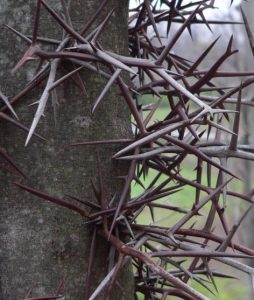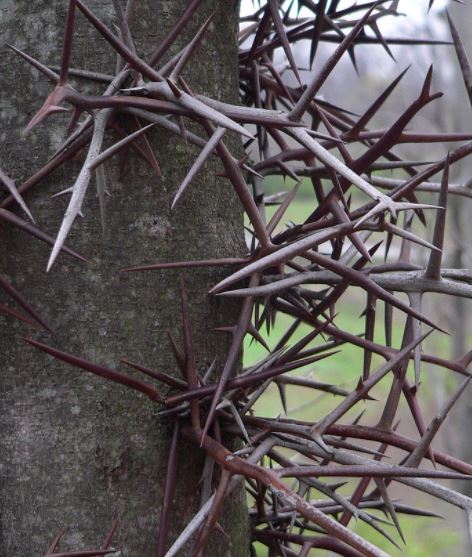
Trifoliate Orange
If you are looking for a small tree with thorns, Trifoliate orange, (Citrus trifoliata) makes a great hedge in a place you want to discourage people from going. If you have ever been on the campus of Oklahoma State you probably noticed the thorny hedges that keep the students from crossing over into other areas. Plant a few of these under your windows and you won’t have to worry about anyone breaking in through those windows. The cultivar “Flying Dragon” is dwarfed in size and has highly twisted, contorted stems.
The thorns on trifoliate orange are very large and sharp. If you have children this small tree and trees with thorns in general probably wouldn’t be a good choice.
Mesquite Trees
Mesquite (Prosopis glandulosa) tree requires little water and is a low-maintenance Texas native, found throughout the state. The trees have a reputation for being invasive, especially on grazing sites, since its two-inch thorns pose a danger to livestock. Mesquite trees adapt to most soils, tolerate very high heat and drought conditions. On the plus side, they produce fragrant flowers and long bean pods. These seed pods attract wildlife and provide perches and nesting sites for all kinds of birds, most notably, the hummingbird.
Roemer’s Acacia
Cold-hardy Roemer’s acacia (Acacia roemeriana) is an evergreen or semi-evergreen tree that produces cat-claw-shaped thorns. Roemer’s acacia’s greenish white to creamy white, globe-shaped flower bloom in spring. It produces flattish and twisted pods that make a mess in a lawn. Like many Texas native thorny trees, it adapts to alkaline or limestone soils, Depending on the soil, Roemer’s acacia’s growth will max out at between 6 and 20 feet. It thrives even in dry, hot conditions.
Honey Locust
Honey Locust (Gleditsia triacanthos) can both be found in the DFW area. Honey locust trees have large thorns, often 1/4 inch long. They can grow to 60-100 ft tall so that is a lot of thorns. Besides being full of thorns, Honey locust trees have seed pods that fall in Autumn qualifying them for the DFW Messy Trees list. Interestingly, the Native Indians would eat the pulp inside the seed pods which had a sweet taste, thus the name Honey Locust. It is also believed the seed pods were fermented into an alcoholic drink.
DFW Trees With Thorns on Foliage
American Holly
American holly trees (Ilex opaca) are known for having thorny foliage, with spikes prominent along the edge of each leaf. A slow-growing evergreen, it stands up to drought, alkaline soil, and heavy shade. It grows so slowly it is usually thought of as a large shrub, but it actually grows up to 100 feet tall when given enough time. Its fruit attracts wildlife. The trees are resistant to many pests, but its greenish-white flowers aren’t spectacular. Its bark is vulnerable to damage, but overall, the tree resists breakage.
Trees with thorns are obviously not for everyone, but in the right situation, these unique plants can add a certain amount of personality to your landscape and in the case of Trifoliate Orange add some protection.
All of these trees can benefit from fertilization, especially when they are young. Consider root level injections that can deliver fertilizer and insecticide directly to the root zone of the trees. You can read more about Root Level Injections here.
